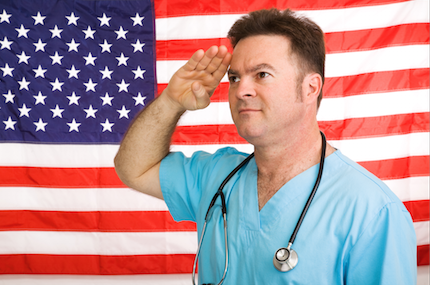What We Owe Returning Vets
Author: Dick Bolles

Some men and women in America are combat veterans. Films like American Sniper, Hurt Locker, and Lone Survivor have opened the door to our understanding what a sacrifice combat veterans have made for us. But actually, a veteran is anyone who has served in the Armed Forces of the United States. There are more than 21,200,000 veterans in the U.S.
What do we owe them? Four things, it seems to me.
(1) REMEMBRANCE. Some of them laid down their lives for us, in the service of fighting oppressors and architects of evil. These veterans are gone, now, at least from earthly view. Except among their families and friends, it is easy to forget their sacrifice. That was, after all, yesterday. So, once a year we have a Veterans Day when we deliberately remember, anew. We visit cemeteries, or crypts, or the graves of the Unknowns. We hold parades and concerts and solemn services, remembering all who laid their lives for us, in what Jesus called, "no greater love than this." Hoping they can hear, even in another world, our undying gratitude for their sacrifice. And we need to do this more than once a year.
(2) CELEBRATION. 2,600,000 veterans served in recent wars. A million of them are coming home through 2018. The vast majority of them not only came home unscathed, but stronger, braver, more disciplined, more skilled, more mature than they ever were before. They make magnificent employees that any employer would be lucky to hire. This is highlighted in some recent books, such as the November 4 release of "For Love of Country: What Our Veterans Can Teach Us About Citizenship, Heroism, and Sacrifice" by Howard Schultz and Rajiv Chandrasekaran. The armed services were a blessing to them. And to us. And to our workplace.
(3) MERCY & COMPASSION.
Over 90% of those who have just come home, or are coming home, do not —do not—suffer from psychological or mental disabilities. But 250,000 Iraq or Afghanistan veterans do, and have been treated for PTSD. 50,000 veterans are currently homeless, every night. 22 veterans commit suicide every day. Small percentages, from the larger view of things! But percentages be damned! Every single individual is precious in God's sight. One disabled vet is one too many. Anything, anything, we can do to help with the cost of their treatment is an act of mercy and empathy. It not only helps them; it makes each of us better at being a human being that the earth can be proud of. I have given; I hope you will, too.
(4) Lastly CODE-BLUE HELP. Of course returning vets need help in finding employment. Job-hunting is a mystery even to those of us who have never served in the armed forces. It is often even more of a puzzle to returning vets. The unemployment rate is currently 7.2% among male veterans; among female veterans, it's 11.2%. By comparison, among the rest of us it's only 5.8%. Returning vets need help in finding meaningful work. But this means more than just giving them help with writing resumes and conducting interviews. That often is just not enough.
Hospitals have a particular vocabulary that is useful here. The term is "code-blue." It refers to an emergency in which a patient is in cardiopulmonary arrest, requiring a team to rush to the patient and begin immediate extra efforts to pull them through. Much of job-hunting today, for veterans and non-veterans alike, is in a code--blue situation since 2008. Training in resumes and interviews just isn't enough. Returning vets need extraordinary creativity, new approaches, alternative solutions.
So, in the newest edition of Parachute (the 2015, currently in bookstores or online), I added a new 20 page section to help returning vets or those who are trying to help returning vets, find meaningful employment and work. I spent three months researching and evaluating the most helpful resources in approaching code-blue job-hunts. Don't let all that research go to waste. Read it, use it, give it to a returning vet you know.